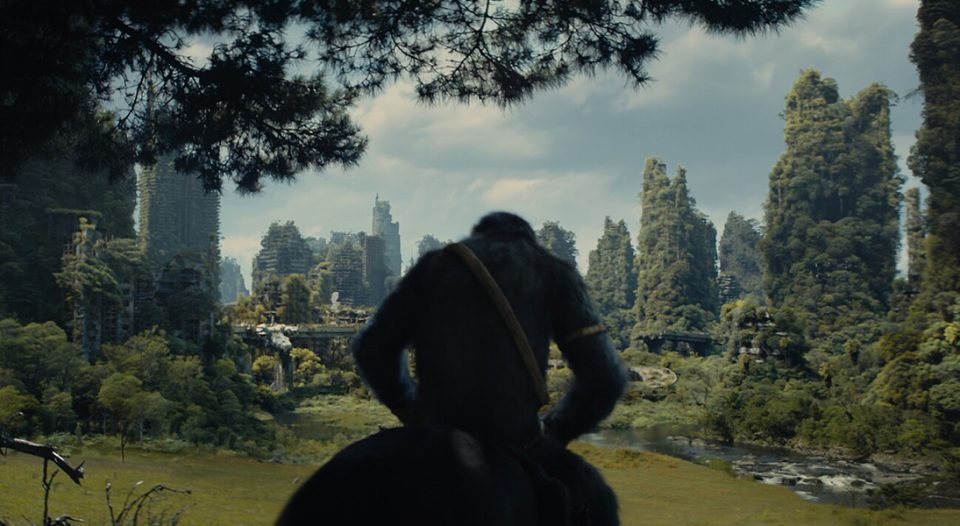At the end of the movie’s first act, the peaceful Eagle Clan we’ve followed through the opening 20 minutes of Kingdom of the Planet of the Apes is in ruins. The tribe of chimps devoted to living in symbiosis with nature could not stand against a platoon of mask-wearing, rampaging apes who invaded, burning the settlement and dragging away the few captives they left alive. Young Noa (Owen Teague) does his best to fight back against the hordes, but only the sacrifice of his father allows him to live.
As Noa blacks out, his still-breathing body lost among the piles of corpses, he hears one phrase echoing above the screams and sobs: “For Caesar!”
That’s a surprising battle cry from the violent gorillas, not just to Noa. By ascribing such horrific actions to the heroic chimp of the previous three movies in the modern Planet of the Apes franchise, the attackers highlight the film’s themes of interpreting sacred texts.
The new Kingdom of the Planet of the Apes is the fourth in a series that began with 2011’s Rise of the Planet of the Apes, a trilogy of prequels to the franchise that started with 1968’s Planet of the Apes, itself an adaptation of the novel by Pierre Boulle. In Rise and its two sequels, Dawn of the Planet of the Apes (2014) and War for the Planet of the Apes (2017), Caesar transitions from a normal chimp in a human laboratory to leader of an ape revolution, trying to maintain peace among other simians and the scared surviving human population.
Like its predecessors, Kingdom engages in big ideas about the nature of society and humanity, functioning as a prophetic warning against current trends.
Written by Josh Friedman and directed by Wes Ball, Kingdom takes place 300 years after Caesar’s death, in which apes rule the planet and the few remaining humans have lost their speech, living like animals in wild packs. After his tribe is destroyed, Noa goes on a quest to find the captives, which brings him alongside the peaceful orangutan Raka (Peter Macon) and the intelligent human Mae (Freya Allan).
Like its predecessors, Kingdom engages in big ideas about the nature of society and humanity, functioning as a prophetic warning against current trends. The 1968 Planet of the Apes famously ended with Charlton Heston’s time-traveling astronaut Taylor cursing humanity for using the atom bomb, destroying the world and making way for the apes. Kingdom points to a less obvious threat: interpretations of sacred texts.
Kingdom’s primary villain, the bonobo Proximus Caesar (Kevin Durand), doesn’t appear until more than halfway through the film, when he swings onto a platform above crowds chanting his name. In a move that mirrors real-world demagogues, Proxima leads the group in a recitation of Caesar’s words: “Apes together strong.” Proximus uses those words to drive his followers into submission, compelling them to participate in actions that may well lead to the further destruction of the planet.
However, Proximus is not the only follower of Caesar. Raka’s peaceful ways—which also teach Noa how to care for Mae—stem from his understanding of Caesar’s teachings. Throughout the film he cites Caesar when advocating for virtuous actions, choosing mercy and understanding over oppression because of his religion.
The Bible often asks more questions than it answers, constantly challenging those who are looking for a simple list of do’s and don’ts.
Proximus’ behavior recalls elements of Christian Nationalism, which, as described in the ECLA’s statement against the movement, “stand[s] for things we in our tradition identify as contrary to the Gospel and opposed to what it means to be Christian.” To its credit, Kingdom disrupts any easy dichotomies, showing both Proximus and Raka as given to misunderstanding the true Caesar. In one humorous scene, Raka stands in the ruins of an airport and talks about how Caesar taught flight to humans, something we viewers know isn’t true.
For Christians, this confusion around making sense of sacred texts may be the movie’s most relatable aspect. As many of us have found, the Bible often asks more questions than it answers, constantly challenging those who are looking for a simple list of do’s and don’ts. At the same time, Scripture also includes simple statements about the important aspects of Christian life, as in John 13:31-35 and Mark 12: 30-31.
Perhaps the most powerful example occurs in Luke 7, when a distraught and imprisoned John the Baptist sends his disciples to look for clarification. In response to his cousin’s doubt, Jesus doesn’t offer reams of exposition or a litany of proof texts. Rather, he points to the outcomes of his ministry: “The blind receive their sight; the lame walk; those with a skin disease are cleansed; the deaf hear; the dead are raised; the poor have good news brought to them. And blessed is anyone who takes no offense at me” (22-23). In other words, if people are being freed and healed, then God is at work.
That principle is reflected in simian form in Kingdom of the Planet of the Apes. Promixus doesn’t understand the teachings of Caesar—but he doesn’t care, as long as it gets him more power. Raka also gets some details wrong, but he also teaches others how to be kind and merciful. If the apes in the story understand this principle, certainly we can too.




